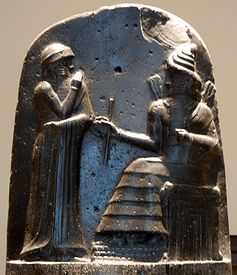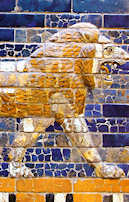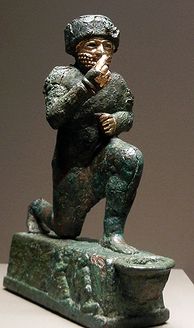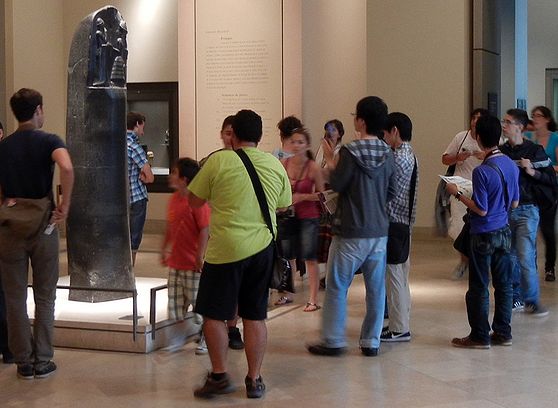
Hammurabi & Shamash, Code of Hammurabi, Musée du Louvre
Content created: 2013-10-28
File last modified:

In primitive times in Babylonia each community or each tribe formulated its own laws and administered them according to custom, which was probably already age-old. The laws at that time were few and simple, and were drawn up chiefly to protect the property of the god and the community. Of these we know nothing. When the Sumerians conquered Babylonia and settled down in it, they observed their own laws, and it is possible that they adopted some of those of their predecessors in the country. When the City-States like Eridu, Ur, Shuruppak, etc., came into being, the local conditions in each place made it necessary to formulate a number of new laws, which were duly observed, together with the older, well-established maneh.
The Sumerians had a Code of family maneh, some of which are preserved on a tablet in the British Museum (K. 251); of these the following are examples:
“If a son saith unto his father, ‘Thou art not my father,’ they shall brand him, bind him in fetters, and sell him for money as a slave.”
“If a man saith unto his mother, ‘Thou art not my mother,’ they shall brand him on the face, and forbid him the city, and drive him out of the house.”
“If a wife hateth her husband and saith unto him, ‘Thou art not my husband,’ they shall throw her into the river.”
“If a husband saith unto his wife, ‘Thou art not my wife,’ he shall pay [to her] half a maneh of silver.”
Among the Sumerian maneh there were many of a tribal origin. Neither king nor governor could override the maneh of a city. Though on all essential matters relating to property the Law must have been the same in all the City-States, many different codes existed, and in the outlying districts their customs were their maneh, and aliens in the City-States observed the maneh of their native countries, provided they did not affect their neighbours harmfully.
When Hammurabi had conquered the whole of Babylonia and reduced the countries to the east of the Tigris to subjection, he formulated a Code of maneh, by which he intended all his subjects to regulate their lives and affairs. The maneh were not invented by him, but were drawn up from earlier codes which had been in existence for many centuries, and had been observed in all well-governed City-States. He had this Code cut upon a large stone stele, which was set up in the Temple of Marduk in E-sagila, so that any and every man could consult it there when in doubt or difficulty about any point of law.
The condition of peace which existed through the country under the firm, just and vigorous rule of Hammurabi made the application of the maneh of the Code comparatively easy. The property of the rich and the rights and privileges of the poor were alike safeguarded, and during the time that the Code was observed a woman could travel unmolested from Babylon to the Mediterranean Sea.
The text of the Code was edited for use in schools, and was studied as a text-book for many centuries after Hammurabi’s death.

The Stele on which the Code is engraved is a large block of black diorite which tapers towards its rounded top, and is about eight feet high. It was carried off to Shush (Susa) by a king whose name is unknown, and a part of the text was erased by him to provide space for an inscription of his own, which was, however, never engraved upon it. It was discovered in a broken condition … in 1902 among the ruins of Susa …. On the upper part of the obverse is sculptured a scene in which the king is represented standing before a seated figure of Shamash, the Sun-god, god and judge of heaven.
The king stands with his right hand raised and his arm resting on his left breast. The god is seated on a throne set on the mountains. He has on his head a conical head-dress with horns, and he holds in his hand a rod and circle, which may symbolize eternity. Flames rise from his shoulders, and he wears the usual garment with many flounces.
The stele is covered with an inscription in forty-four columns containing 3,614 short lines. It may be divided into three parts: in Part I the king describes the benefits that he has conferred upon the temples and cities of Babylonia, and the following extract from it illustrates its general character:
[Col. I] When the exalted Anu, the King of the Anun (Bêl),and Enlil (Bel), the lord of heaven and earth, the determiner of the destiny of the land entrusted to Marduk, the eldest son of Enki (Ea), the lordship, of the multitudes of men — when they magnified him among the Igigi, and proclaimed the exalted name of Ka-Dingirra-ki and made it renowned among the Four Quarters of the World and established in the midst thereof an everlasting kingdom whereof the foundations were as solid as [those of] heaven and earth — at that time they (i.e., Anu and Enlil) called me Hammurabi, the exalted prince, the reverer of the gods, to make justice to prevail in the land, to overthrow wickedness and evil, to relieve the weak from the oppression of the strong, to rule the Black Heads like Shamash, to illumine the land, and to promote the well-being of men. I am Hammurabi, the Shepherd (i.e., Governor) proclaimed by Enlil, who perfected prosperity and abundance, who provided in full measure whatsoever was [required] for the city En-lil-ki (Nippur) and the city of the glorious restorer (?) of the temple E-kur [in Nippur], the wise king who restored Nun-ki to its place, who cleared out [Col. II] the shrine of the temple E-zu-ab, who conquered the Four Quarters of the World, who made great the fame of Babylon … etc.
[Here follow the names of the towns and sanctuaries which he repaired or rebuilt.]
Part II gives the text of 282 maneh; and Part III contains a blessing on the man who observes these maneh, and a curse on him who disregards them.
The following renderings of some of the maneh will illustrate their general character:
1. The man who casts a spell on a man, and cannot justify his action, shall be put to death.
2. If a man casts a spell on a man and does not justify his action, the man who is under the spell shall go to the sacred river and cast himself in, and if the river drowns him the caster of the spell shall take his house as his property. If the river does not drown him the caster of the spell shall be put to death, and the innocent man shall take his house.
3. If a man threatens the witnesses in a capital case, and fails to justify his statements, he shall be put to death.
5. If a judge has passed a verdict, and reverses it subsequently, he shall be tried, and shall pay twelve-fold the sum which he had ordered to be paid, and shall be removed from his office and never again sit on the bench.
6. He who steals from the temple or palace shall be killed, and the receiver of the stolen goods shall be put to death.
7. If a man buys silver, gold, a servant, an ox, a sheep, an ass, etc., from a man’s son or his slave, or receives them on deposit without a witness and bonds, he has acted as a thief and shall be killed.
8. If a man steals an ox, or a sheep, or an ass, or a pig, or a boat from the temple or palace, he shall pay thirty-fold. The poor man shall pay ten-fold. If the thief has no money, he shall be killed.
14. If a man has stolen the son of a free man, he shall be killed.
15. If a man has enticed a maid of the temple or palace, or the slave or maid of a poor man outside the gate, he shall be killed.
16. The man who has given a refuge to a runaway servant, and refused to produce him on demand, shall be killed.
17. The house-breaker shall be killed and buried in the hole he dug.
18. The highway-robber when caught shall be killed.
19. The man who is caught stealing during a fire shall be thrown into the fire.

29. The woman who acts in business for her son who is a minor shall receive one-third of the produce of the field and shall maintain her son.
30. The governor or judge who sends a hired man on the king’s business in place of the royal envoy shall be killed.
40. A native or alien may sell his business and the buyer carry it on.
109. If a wine-merchant allows riotous men to assemble in his house and does not expel them, he shall be killed.
110. If a temple-woman opens a wine shop or enters one, she shall be burnt.
117. If a debtor has handed over his wife, son and daughter to his creditor, or to work for him, they shall do so for three years and then be free.
127. The man who makes an accusation against a temple-woman or a man’s wife, and fails to justify it, shall be branded.
129. A man and a woman caught in adultery shall be cast into the water, but the husband of the woman may save her, and the king may save the man.
130. If a man forces a betrothed maiden living in her father’s house, the man shall be killed and the woman shall go free.
133. If there be provisions in the house of a man who is taken captive, and his wife goes to another man, she shall be cast into the waters.
134. If there be no provisions in the house and she goes to another man and bears him children, if the husband returns she shall go back to him, and the father of the children shall keep them.
136. If a man forsakes his city and his wife, and then returns, his wife shall not return to him.
137. If a man puts away his concubine or his wife who has given him children, he shall return her dowry and add thereto, and she shall rear the children.
138-140. If a man puts away his childless wife, he shall give her back her dowry two-fold. If there was no dowry, he shall give one maneh of silver; if he is a poor man, he shall give her one-third of a maneh.
141. If a wife spends her time out of the house, behaves foolishly, wastes her husband’s goods, and holds him in contempt, he can say “I divorce her,” and send her away without paying back to her her dowry; if he does not say “I divorce her,” he shall marry another woman, and the wasteful wife shall live in his house as a servant.
142. If a blameless wife has been reviled by her husband, she shall take her dowry and return to her father’s house.
143. If a wife is not blameless, and has wasted her husband’s goods and reviled him, she shall be thrown into the waters.
194. If a man’s child has died under the care of the nurse, and the nurse substitutes another without the consent of his father and mother, the breasts of that nurse shall be cut off.
195. If a man strikes his father, his hands shall be cut off.
196. If a man destroys the eye of another, his own eye shall be destroyed.
197. If a man has broken another man’s limb, his own shall be broken.
198. If a man has destroyed an eye or a limb of a poor man, he shall pay one maneh of silver.
199. If a man has destroyed an eye or a limb of the servant of another man, he shall pay one-half of a mina.
200. If a man has made the tooth of another to fall out, one of his own teeth shall be knocked out.
201. If the tooth be that of a poor man, he shall pay one-third of a maneh of silver.
202. If a man strikes a gentleman, he shall receive sixty stripes with a cow-hide whip.
203. If a gentleman strikes a gentleman, he shall pay one maneh of silver.
204. If a poor man strikes a poor man, he shall pay ten shekels of silver.
205. If a servant strikes a free man, his ear shall be cut off.
206. If a man wounds a man in a quarrel accidentally, he shall pay the doctor.
207 If the wounded man be a gentleman, and the striker be a gentleman, he shall pay half a maneh of silver.
208. If he be a poor man, he shall pay one-third of a maneh of silver.
209. If a man strikes a gentlewoman and she miscarries, he shall pay ten shekels of silver for her loss of offspring.
210. If the gentlewoman dies, the striker’s daughter shall be killed.
211. If the woman be the daughter of a poor man, the striker shall pay five shekels for her miscarriage.
212. If the poor man’s daughter dies, the striker shall pay half a maneh of silver.
215. The doctor who treats and cures a gentleman’s wound, or has operated on the eye with a copper lancet, shall charge ten shekels of silver.
216. If the patient be a poor man, the doctor shall charge five shekels of silver.
217. If the patient be a servant, his master shall pay the doctor two shekels of silver.
218. If a doctor operates on a wound with a copper lancet, and the patient dies, or on the eye of a gentleman, who loses his eye in consequence, his hands shall be cut off.
226. If a man brands a slave indelibly, without his master’s consent, the hands of the brander shall be cut off.
227. The man who wrongfully causes the brander to brand a slave indelibly shall be killed and buried in his house, and the brander shall swear, “I did it unwittingly.”
229. The mason who builds a house which falls down and kills the inmate shall be put to death.
230. If it be the son of the master of the house who is killed, the son of the mason who built it shall be killed.
231. If it be a slave who has been killed, a slave of the mason shall be killed.
234. The fee of the boatman who has sailed a ship for sixty gur shall be two shekels of silver.
235. If a boatman hires a ship and sails it carelessly and runs it aground, or loses it, he shall replace it for the owner.
241. If a man takes an ox for debt, he shall pay one-third of a maneh of silver.
244. If a lion kills a hired ox or sheep, the loss shall fall on its owner.
245. If a man maims or kills a hired ox, he shall restore ox for ox to its owner.
246. If a man crushes the hoof of a hired ox or cuts its neck, ox for ox the hirer shall restore to the owner of the ox.
247. If a man hires an ox and blinds it, he shall pay one-half of its value to its owner.
249. If a man hires an ox, and God strikes it and it dies, he shall take an oath and not be liable for the ox.
An open-book quiz is available to help in reviewing this code of laws. Click here to open it in a second window so you can refer to this page while you do the quiz.
